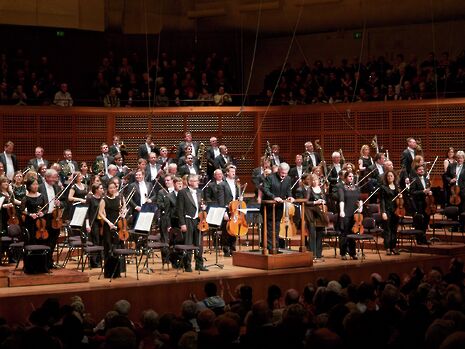Royal Philharmonic Orchestra at Cambridge Corn Exchange
The RPO’s return to the Corn Exchange was not without fanfare, writes James Watkins

This season sees the Royal Philharmonic Orchestra reprise their role as orchestra-in-residence at the Cambridge Corn Exchange. At their opening concert last Friday they brought the perfect blend of augur and alacrity to the 30th anniversary of the Cambridge Classical Concert Series.
Given the long-standing commitment of both the RPO and Cambridge Live to outreach programmes and the diversification of the contemporary classical audience, it is fitting that the programme opened with the overture to Rossini’s Guillaume Tell. One of the most loved and most accessible of all orchestral overtures – perhaps overshadowed in the collective conscience only by that of Bizet’s Carmen, or Tchaikovsky’s 1812 thanks to its recent murderous appropriation into a ringtone on a Spotify non-premium advert – it was a lively way of warming up orchestra and listeners alike.
Indeed, Alexander Shelley – conducting without a score – used the affectionate bluster of the overture to highlight from the outset the excellent rapport he’s built with the RPO since his appointment in January of last year. The orchestra looked on with rapt attentiveness during his intimate dialogue with principal cellist Jonathan Ayling in his serene solo introduction, and the audience couldn’t help but follow suit. The whole first section of the overture was spaciously done with a reverent remove, such that the blustery crescendi which punctuate the famous theme roused even more than usual.
The Mendelssohn Violin Concerto was a treat. Carolin Widmann, acclaimed German soloist, married perfect technique to visceral musicality. The saccharine tones of her 1782 G.B. Guadagnini violin soared over Shelley’s delicately thrumming orchestra in the first movement’s Moorish first theme. The movement’s cadenza did as all cadenza do and fascinated the audience, but it was the understated virtuosity directly following it as the orchestra wistfully took up the theme that stole the show.
Shelley made much of the lachrymose ambiguity of the second movement’s opening bars, which allowed Widmann to truly blossom into her delightful pastoral C major theme. Her encore, the Sarabande of Bach’s Second Partita, was announced in a gruff bark at odds with the warmth evoked in the concerto – but this was quickly mollified by an excellent performance.
Sibelius once commented famously of his Second Symphony: “It is as if the Almighty had thrown down the pieces of a mosaic for heaven’s floor and asked me to put them together”. On the night, Shelley handled this divine task wonderfully, bringing out the vitality of its self-professed organicism – perhaps precipitated by his conducting the work, like the opening overture, without a score. The decision – and one that is becoming increasingly popular amongst conductors – to turn around before the symphony and discuss its conception, structure and artistic import to him personally endeared Shelley even more and was a welcome addition to the evening.
Under his baton the Second did indeed grow organically out of thematic mosaic tiles that Sibelius associated variously with Roman heat (first movement), the legend of Don Juan haunting his nightmares (second movement) or simply the “happiest I’ve ever written” (fourth movement). The elision of the third and fourth movements was handled with aplomb: an ephemeral flick of Shelley’s wrist and the monumental climax that rode us into the fourth was dissipated in a flash; the high brass, led by James Fountain (trumpet) and Laurence Davies (horn) coruscated at alpine heights as they heralded the arrival of one of Sibelius’ most stirring finales. Twelve or so minutes later, the audience filed out of the Corn Exchange with none of the usual apprehension of a cold October’s chill – our bellies were full of freshly-stoked Sibelian fire.
The next concert in this year’s Cambridge Classical Concert Series will take place on Tuesday 15th November at the Corn Exchange and will see the city welcome the Czech National Symphony Orchestra to play a programme of Schubert, Shostakovich and Dvorak.
 News / Cambridge academics stand out in King’s 2026 Honours List2 January 2026
News / Cambridge academics stand out in King’s 2026 Honours List2 January 2026 Interviews / You don’t need to peak at Cambridge, says Robin Harding31 December 2025
Interviews / You don’t need to peak at Cambridge, says Robin Harding31 December 2025 Comment / What happened to men at Cambridge?31 December 2025
Comment / What happened to men at Cambridge?31 December 2025 News / Unions protest handling of redundancies at Epidemiology Unit30 December 2025
News / Unions protest handling of redundancies at Epidemiology Unit30 December 2025 News / Varsity’s biggest stories of 202531 December 2025
News / Varsity’s biggest stories of 202531 December 2025









